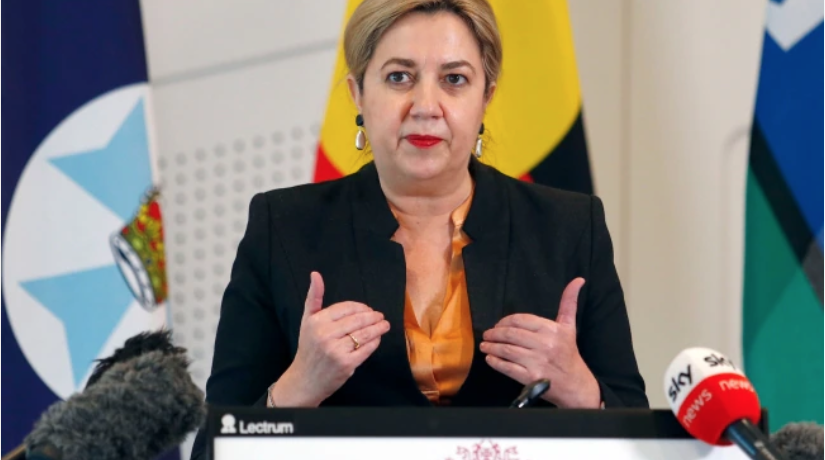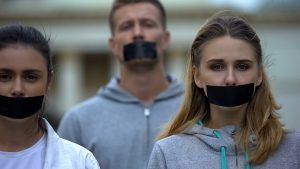State governments will push ahead with Voice treaties anyway

Ignoring the Australian people.
STATES TO GO AHEAD
Despite the Australian public overwhelmingly rejecting the establishment of a Voice to Parliament body, states will push ahead with the plan anyway.
Most states are set to either introduce/pass legislation, or enhance existing programs, to accommodate the agenda on a local level and bypass the will of the Australian people.
We saw similar moves after national facial recognition legislation was rejected in 2019, with states deciding to go ahead with the plans anyway. A typical play by the ruling class and their tier-levelled system of governmental control as a ‘backup’ plan.
They didn’t waste any time with this, however, stating the intention to ‘get back on track’ and get the vision fulfilled within days of the referendum’s defeat.
Let’s take a look at each state, what they have planned and the thoughts of those behind it:
South Australia
South Australian Premier Peter Malinauskas said the Australian people have made it clear they are against a constitutionally enshrined national voice, but he has no intention to shelve his state’s legislated voice.
The SA Voice will still go ahead, with predictions it will be implemented in 2024.

The Premier ‘stressed’ it does not propose to change the Constitution.
“So it’ll roll out and I think it’ll be largely non-controversial,” he told reporters.
“It’s very different in nature to what was being proposed yesterday in the referendum.”
But here’s the thing: It wasn’t the change of text people were concerned about, it was everything else.
And, when you actually look at the proposed bill, we see that apart from Constitutional recognition, the overall mission to establish an external Voice to parliament is practically the same.
And too, are some of the land-grabbing concerns that come with it.

One Nation MP, Sarah Game, will introduce a bill to repeal the state’s voice but without the government’s support. It has little chance of success, but at least there are some representatives left.
New South Wales
Next, we turn to New South Wales, where Premier Chris Minns has said he “remained committed” to kickstarting treaty discussions with Indigenous people in the state, despite the result.

After the weekend’s result, Minns emphasised that a treaty in and of itself was a “blank document” — with the content entirely determined by what’s negotiated and agreed between the government and First Nations people.
That’s right, New South Wales citizens won’t get a say.
Minns wants to see a state treaty address cultural water access to the Murray Darling Basin and coastal rivers, fishing arrangements, ownership and management of national parks, and access to sacred sites.
“Aboriginal people are saying we’re not going to take your land off you, but we want access to sacred sites, we want access and we want to protect them,” he said.
Minns speaking on behalf of the Indigenous again, with no sign of a referenced or sourced elder in sight, and you can expect plenty more of that with any coming ‘negotiations’.
When have governments ever actually tried to help the Indigenous? And people think they will now?
In addition, he said mining royalties should also be on the table.
Of course, if allowed to pass, it will be the ‘Indigenous Management Corporations’ that will take the stakes and run all of these programs ‘on behalf’ of the Indigenous themselves.
Queensland
Queenslanders delivered the most emphatic rejection of the voice, with almost 70 per cent voting ‘no’.
But, good old Annastacia Palaszczuk has already come out to say the government will continue down its path toward a treaty with Aboriginal and Torres Strait Islander groups.

Palaszczuk said she was “confident” that all Australians agreed there was a need to improve the wellbeing of First Nations people, and this is why a treaty is ultimately needed.
And it is true, we do agree this needs to be done.
But you are the last person who should be in charge of that, Annastacia.
In typical Queensland fashion, the state already passed legislation in May – with bipartisan support – “establishing a pathway to treaty” that will incorporate a three-year ‘truth-telling inquiry’.
“We are a generous nation. And we extend our hearts and our hand to all,” she said.
“This wasn’t the right way. I acknowledge the strong feedback. But that won’t stop our efforts to bring justice, reconciliation and material improvement to the lives of Aboriginal and Torres Strait Islander peoples.”
Do the Aboriginal and Torres Strait Islanders who voted no have a say in any of this, Anna?
Tasmania
The nation’s most senior Liberal, Tasmanian premier Jeremy Rockliff, was a vocal supporter of the yes campaign,
In Tasmania, despite 59.5% of the state backing No, Tasmanian Premier Jeremy Rockliff (who was a vocal supporter of the Yes campaign) will push forward as well,
In an interview on Sunday, he said he was forging ahead with plans for a ‘truth telling’ and treaty process.

He also dismissed suggestions his standing in the party or community had been damaged by his misreading the electorate on the issue.
An Aboriginal advisory group was set up by the government to guide the process and it held its first meeting in February, and will be used as the basis for the state-based plan.
Australian Capital Territory
In the ACT, treaty discussions are ongoing.
Earlier this year, the ACT Legislative Council came out in full support of the Voice.

Given that this was the only state to vote Yes, whatever plans are set to come will no doubt have full support of the people down there.
People like the woman who slammed into a pro-choice protester with her car in February 2022.
Victoria
Next, we turn our attention to states that are practically there already, or are there.
In Victoria, the state does have a Voice to Parliament via the First People’s Assembly, as well as the Yoorrook Justice Commission overseeing the state’s ‘truth telling process’.
The state helped inspire the referendum question, and now the next step is a treaty for Victorians.

Rueben Berg, the Co-Chair of Victoria’s First Peoples’ Assembly, said the state was on track to begin treaty negotiations at the start of 2024.
Western Australia
Western Australia has not committed to a treaty process just yet, but its landmark South-West Native Title Settlement is often cited as “the nation’s first treaty”.
Essentially, WA is already there too, and was also a large inspiration for the referendum.

Signed in 2015 and finalised in 2021, it is the most comprehensive native title agreement negotiated in history – a $1.3 billion settlement of over 200,000 square kilometres of lands, including Perth.

This is where we got the first taste of ‘land management’ practices these policies would involve.
In 2018, the government announced plans to establish an Aboriginal representative body in the state.
The “Father of Reconciliation”, WA senator Pat Dodson, has urged the Cook government to press on with this work, as well as a state-based voice to parliament and ‘truth telling’ process.

Interesting that ‘truth telling’ is a common theme here, when the referendum itself may also be used as a way to censor legitimate truth telling in truly Orwellian fashion.
HIDDEN AGENDA
You may have noticed from the list above that one state is absent from the list.
In the Northern Territory, we actually see things working in reverse.
In December 2022, treaty commission was abolished in the state, with further consultation with Indigenous people to continue for two years before any actions taken.

NT is a major hub of Indigenous culture, various tribes, landmarks and more.
And yet, this state is not entering into any type of Voice agreement or treaty just yet,
The point here being that even when you go to the heart of these cultures themselves, much like the Australian people with the referendum, they have caught on to how much of a rort these organisations/bodies are. And as such, will work for something better after it was abolished.
Indeed, is is largely only the inner-city elitists with no connection to the cultures that are going ahead.
Going ahead against the will of the people.
Again, it was never about recognition in the Constitution, it was everything else that came with it.
Now, that ‘everything else’ is moving forward on a state-based level anyway.
Which makes you wonder yet again about the real purpose of this referendum
One for the obvious reasons of societal division, but also as a way to push through more censorship.
Within hours of this result, the Yes campaign were already crying out that so-called ‘online misinformation’ played a huge part in skewing referendum voting.
In an effort to save the country from a centralised land grab, Australians may have just given the state what it needs to ramp up ‘misinformation’ legislative pushes against free speech:
And, in the light of this new news from the states, it seems the mentality is now:
‘The people were misinformed, so we will make the decisions for them’.
‘And make sure they can never misinform again’.
Now it is up to the people in every state to get involved in their communities to push back.
Source: https://tottnews.com/2023/10/16/states-push-ahead-voice/






